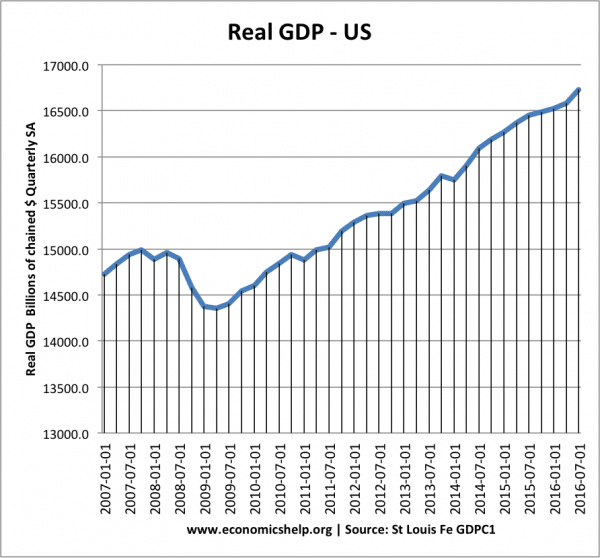The US Economy Under Pressure: Examining The Impact Of The Canadian Travel Boycott

Table of Contents
The Tourism Sector Takes a Hit
The immediate and most visible impact of the Canadian Travel Boycott is felt within the US tourism sector. The significant drop in Canadian visitors translates directly into decreased revenue and economic uncertainty for businesses heavily reliant on cross-border tourism.
Decreased Spending in Border States
States directly bordering Canada, such as Washington, New York, and Michigan, are experiencing the brunt of the decline in Canadian tourism. These border town economies, traditionally bustling with Canadian visitors, are now facing significant economic headwinds.
- Decline in hotel bookings: Reports indicate a [insert percentage]% drop in hotel occupancy rates in key border cities, leading to reduced revenue and potential layoffs within the hospitality industry. For example, the [Name of Hotel] in [City, State] reported a [Percentage]% decrease in bookings since the start of the boycott.
- Restaurant revenue slump: Restaurants and eateries near border crossings are witnessing a sharp decline in customer traffic, resulting in decreased sales and potential staff reductions. Many small, family-owned restaurants are particularly vulnerable.
- Retail sales downturn: Retail businesses, especially those selling goods popular with Canadian tourists, are experiencing a significant dip in sales. This includes everything from souvenir shops to larger retail outlets in border towns.
These declines highlight the vulnerability of cross-border tourism and the interconnectedness of the US and Canadian economies. The impact extends beyond simple revenue losses; it creates uncertainty and threatens the stability of numerous businesses.
Impact on the Transportation Industry
The reduced demand for travel between the US and Canada has also severely impacted the transportation industry. Airlines, bus companies, and rental car agencies are all feeling the pinch.
- Airline layoffs: Several US airlines operating routes between the US and Canada have announced layoffs or reduced flight frequencies due to the decreased demand for cross-border travel. [Airline Name] recently announced the elimination of [Number] flights per week.
- Reduced bus routes: Bus companies offering cross-border transportation services have also been forced to cut routes or reduce service frequency, leading to job losses and reduced operational capacity.
- Decreased rental car demand: Rental car agencies operating near border crossings have reported a significant decrease in demand, reflecting the overall decline in Canadian tourism.
The transportation industry's struggles underscore the interconnectedness of various sectors within the economy. The impact extends beyond transportation itself, affecting related industries and the overall stability of the travel ecosystem.
Ripple Effects Across Other Sectors
The effects of the Canadian Travel Boycott extend far beyond the tourism and transportation sectors, creating a ripple effect across the US economy.
Reduced Demand for Goods and Services
The decline in Canadian tourism translates into a reduced demand for various goods and services across numerous industries.
- Lower demand for souvenirs: Businesses selling souvenirs and locally crafted goods are experiencing a significant drop in sales, impacting artisans and small businesses.
- Reduced spending on entertainment: Entertainment venues, including theme parks, museums, and concert halls, are seeing lower attendance rates due to fewer Canadian visitors.
- Knock-on effects on supply chains: The decreased demand for tourism-related goods and services is affecting various supply chains, leading to decreased production and potential job losses in related industries.
These indirect effects highlight the broad economic impact of reduced Canadian tourism, demonstrating that the consequences reach far beyond the initial decline in visitor numbers.
Job Losses and Economic Uncertainty
The decrease in tourism spending is leading to job losses and increased economic uncertainty across various sectors.
- Unemployment rates rise: Unemployment rates in border states and communities heavily reliant on Canadian tourism are likely to increase as businesses struggle to cope with reduced revenue.
- Potential for business closures: Many small businesses reliant on Canadian tourism may be forced to close due to unsustainable losses, leading to further job losses and impacting local communities.
- Impact on local communities: The economic downturn resulting from the Canadian Travel Boycott is creating uncertainty and hardship for individuals and families in affected communities.
The potential for widespread job losses and economic hardship highlights the severity of the situation and the need for effective mitigation strategies.
Governmental Responses and Mitigation Strategies
In response to the economic pressure caused by the Canadian Travel Boycott, both federal and state governments are exploring mitigation strategies.
Federal and State Initiatives
Several initiatives are underway to address the economic fallout from the boycott:
- Governmental aid packages: The federal government and affected states are exploring financial aid packages to support businesses and workers impacted by the tourism downturn. The specifics of these packages are still under development.
- Marketing campaigns: Efforts are underway to launch marketing campaigns aimed at attracting tourists from other countries to offset the decline in Canadian visitors.
- Economic stimulus packages: Some states are considering economic stimulus packages focused on sectors impacted by the Canadian Travel Boycott to help boost local economies.
These initiatives highlight the commitment to addressing the economic challenges posed by the boycott, although their efficacy remains to be seen.
Industry Adaptation and Innovation
The tourism industry is responding to the reduced Canadian tourism by adapting and innovating:
- New marketing strategies: Businesses are developing new marketing strategies targeting other international markets to diversify their customer base.
- Diversification of tourism offerings: Many businesses are diversifying their offerings to attract a wider range of tourists and reduce reliance on a single market.
- Cost-cutting measures: Businesses are implementing cost-cutting measures to navigate the economic downturn and ensure survival.
These adaptations showcase the resilience of the tourism industry and the capacity for innovation in the face of economic challenges.
Conclusion
The "Canadian Travel Boycott" presents a formidable challenge to the US economy, particularly impacting businesses and communities deeply reliant on Canadian tourism. While the immediate impact is felt most severely within the tourism sector, the ripple effects spread far beyond, affecting employment, retail sales, and overall economic confidence. Comprehending the multifaceted nature of this economic pressure is vital. Governmental initiatives and industry adaptations are key to mitigating negative consequences and fostering a rapid recovery. Ongoing monitoring of this situation and proactive strategies are essential to effectively address the challenges posed by the Canadian Travel Boycott and its lasting effects on the US economy. Staying informed about the ongoing impact of this significant issue is crucial for businesses and individuals alike. Deepen your understanding of the evolving consequences by researching the effects of the Canadian Travel Boycott on the US economy.

Featured Posts
-
 Are Gpu Prices Out Of Control Again A Deeper Look
Apr 28, 2025
Are Gpu Prices Out Of Control Again A Deeper Look
Apr 28, 2025 -
 Hamas Leaders In Cairo For Ceasefire Talks Amid Trumps Gaza Comments
Apr 28, 2025
Hamas Leaders In Cairo For Ceasefire Talks Amid Trumps Gaza Comments
Apr 28, 2025 -
 Red Sox Roster Update Lineup Shuffle Includes Casas And Returning Outfielder
Apr 28, 2025
Red Sox Roster Update Lineup Shuffle Includes Casas And Returning Outfielder
Apr 28, 2025 -
 Contempt Of Parliament Yukon Politicians Confront Mine Manager
Apr 28, 2025
Contempt Of Parliament Yukon Politicians Confront Mine Manager
Apr 28, 2025 -
 Section 230 And Banned Chemicals A Ruling On E Bay Listings
Apr 28, 2025
Section 230 And Banned Chemicals A Ruling On E Bay Listings
Apr 28, 2025
Latest Posts
-
 Red Soxs Shifting Lineup Impact Of Outfielders Return And Casas Lowered Spot
Apr 28, 2025
Red Soxs Shifting Lineup Impact Of Outfielders Return And Casas Lowered Spot
Apr 28, 2025 -
 Analysis Red Sox Lineup Changes Following Outfielders Return And Casas Demotion
Apr 28, 2025
Analysis Red Sox Lineup Changes Following Outfielders Return And Casas Demotion
Apr 28, 2025 -
 Updated Red Sox Lineup Casas Position Change And Outfielders Reinstatement
Apr 28, 2025
Updated Red Sox Lineup Casas Position Change And Outfielders Reinstatement
Apr 28, 2025 -
 Red Sox Lineup Outfielder Returns Casas Moves Down In The Order
Apr 28, 2025
Red Sox Lineup Outfielder Returns Casas Moves Down In The Order
Apr 28, 2025 -
 Triston Casas Continued Slide Red Sox Lineup Adjustment And Outfielders Return
Apr 28, 2025
Triston Casas Continued Slide Red Sox Lineup Adjustment And Outfielders Return
Apr 28, 2025
